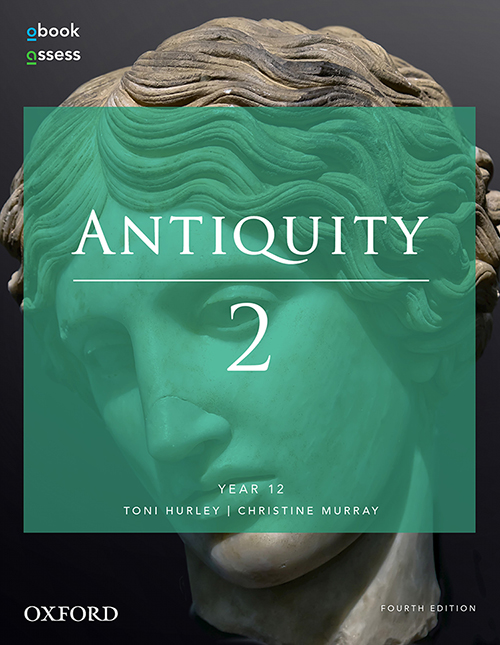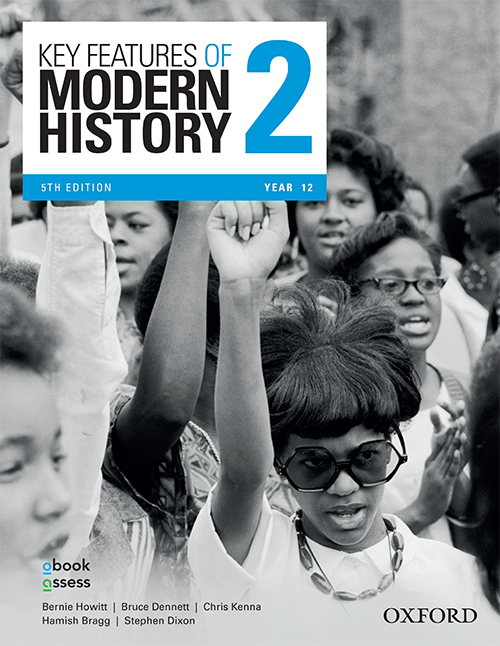Ancient & Modern History - EDM - Page Proofs
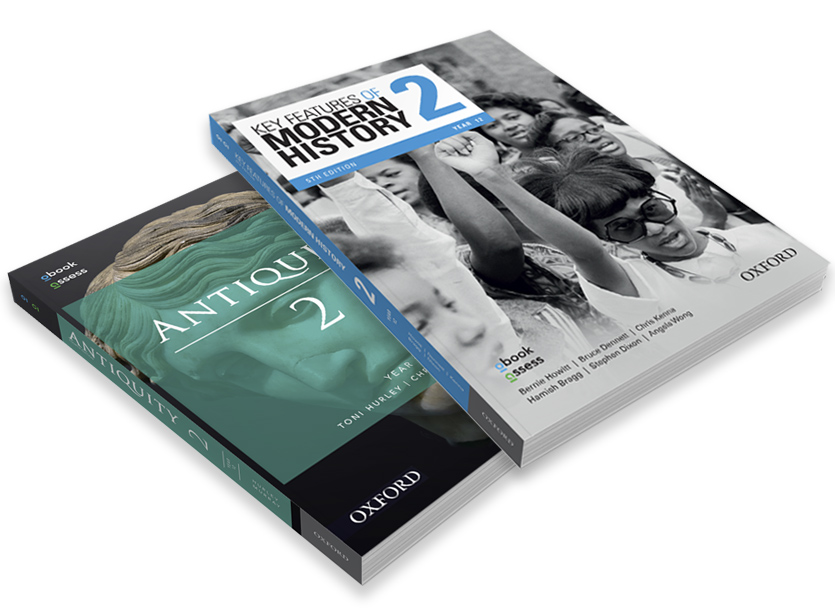
New South Wales Ancient and Modern History
Key Features of Modern History
Antiquity | Stage 6
View page proofs

Preview draft content from the new editions of Antiquity 2 and Key Features of Modern History 2 – page proofs are now available.
Register for obook samples

Sample cloud-based interactive chapters from Antiquity and Key Features of Modern History on obook assess today!
Download free course planners

Confidently plan for the forthcoming updates to the Stage 6 History syllabuses with free Ancient and Modern History course planners.
New South Wales’ most trusted Ancient and Modern History series have been updated for the 2018 Stage 6 syllabuses. Antiquity and Key Features of Modern History each offer unparalleled depth and coverage in easy-to-read, easy-to-understand and easy-to-master formats.
Key enhancements
- All content has been explicitly aligned to the new 2018 Ancient and Modern History Stage 6 syllabuses
- Trusted, in-depth and appropriately levelled content has been developed by expert teachers
- A new, simplified structure organises content into manageable spreads and topics
- Unambiguous language is used throughout with visuals to support learning
- obook assess provides comprehensive student and teacher digital support, including answers to every question in the book, assessment and exam preparation support, videos and more
A pathway to success for every student
- New: ‘Focus questions’, ‘Key concepts and skills’, and ‘Learning goals’ are clearly stated at the beginning of each chapter to guide teachers and students through the content
- New: ‘Check your learning’ questions for each topic allow students to review and expand on what they have learned
- New: ‘Understanding and using the sources’ questions throughout each chapter enhance student understanding of how to use and critically analyse historical sources
- New: A ‘Profile’ for each chapter allows for more in-depth learning about a historically significant person, event or phenomenon
- New: Bolstered by a digital platform, teachers will be equipped with an array of resources to effectively deliver the course, and students will be able to interact with content using a variety of digital tools
Available now
-
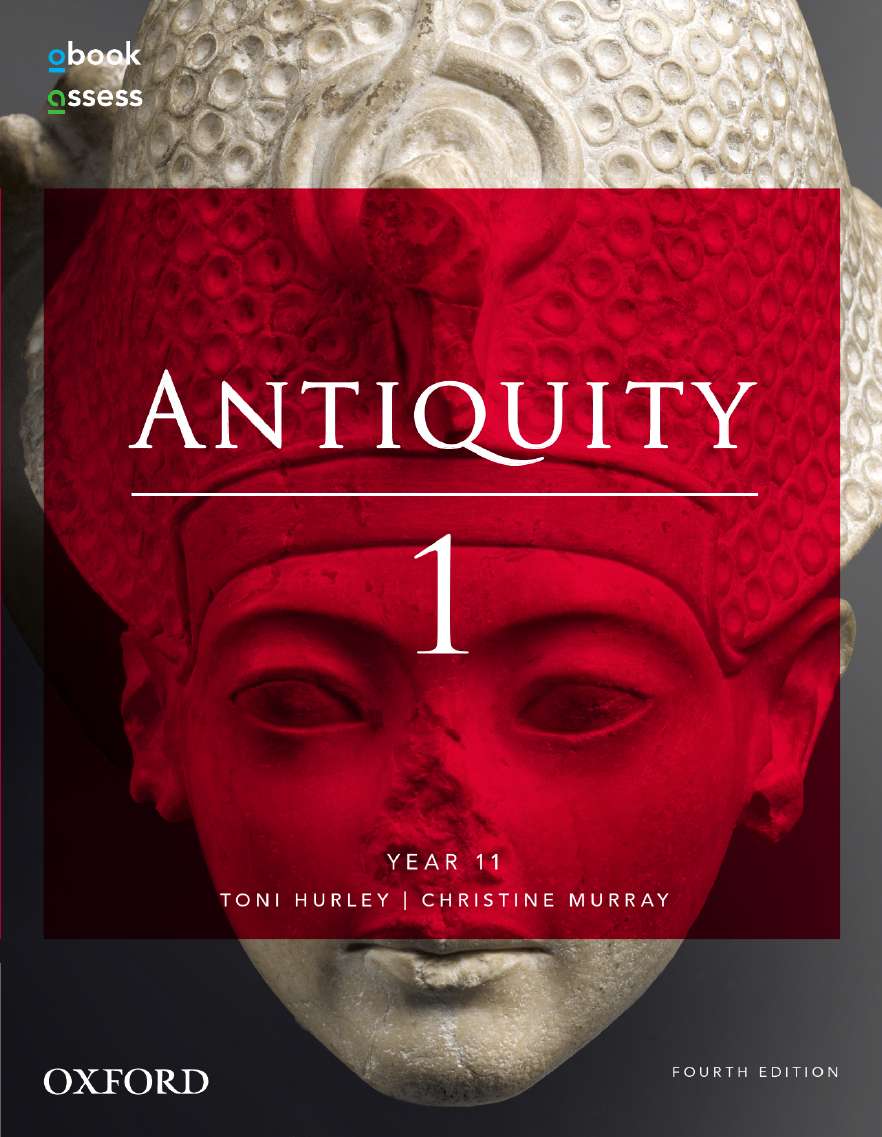 Title:Antiquity 1
Title:Antiquity 1
Year 11 Student book + obook assessISBN:9780190302955Availability:Available nowPrice:$69.95 AUD -
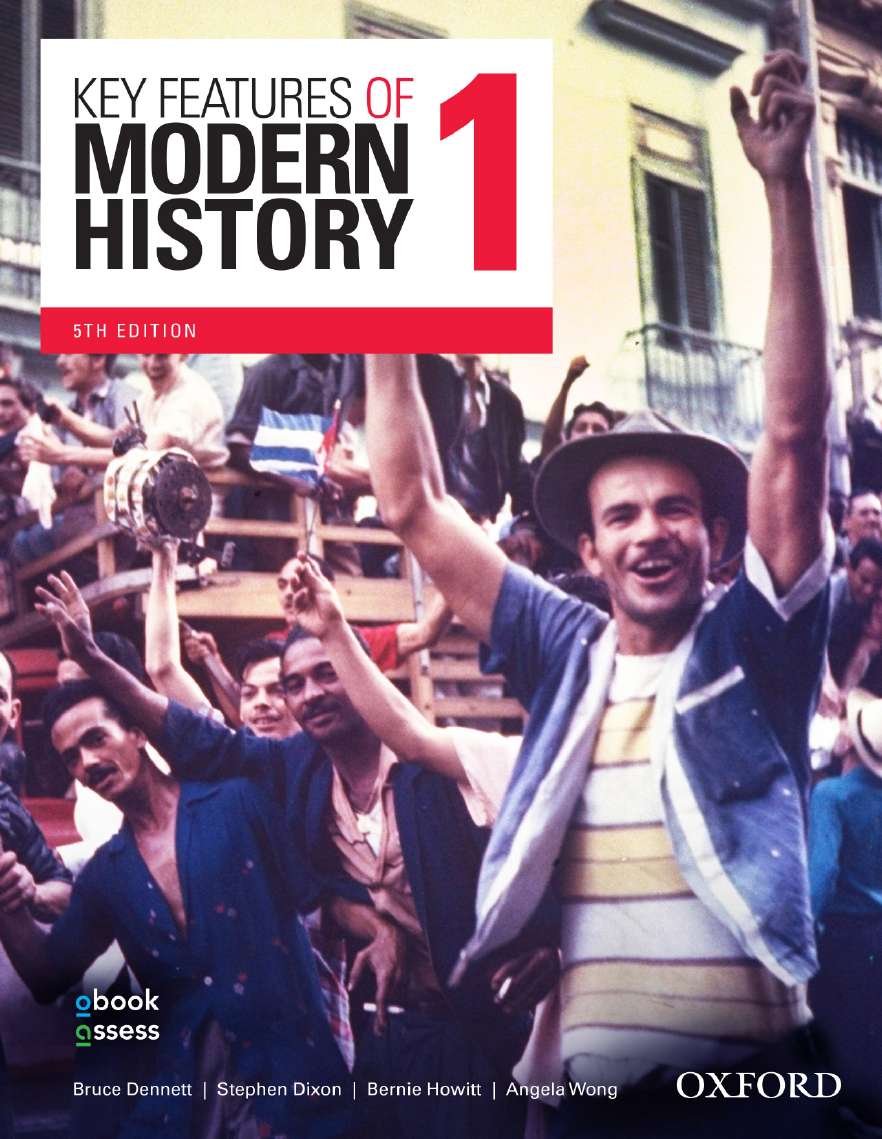 Title:Key Features of Modern History 1
Title:Key Features of Modern History 1
Year 11 Student book + obook assessISBN:9780190310462Availability:Available nowPrice:$69.95 AUD
Coming in 2018
Contents & sample chapters
PART A: INVESTIGATING ANCIENT HISTORY – THE NATURE, METHODS AND ISSUES OF ANCIENT HISTORY
Chapter 1: The investigation of ancient sites and sources
Chapter 2: Historical authentication and reliability
Chapter 3: The representation of the ancient past
Chapter 4: Preservation, conservation and reconstruction of ancient sites
Chapter 5: Cultural heritage and the role of museums
Chapter 6: The treatment and display of human remains View Sample Chapter
Chapter 7: Historical investigation
PART B: INVESTIGATING ANCIENT HISTORY – CASE STUDIES
Chapter 8: Tutankhamun’s tomb
Chapter 9: Thera
Chapter 10: Troy
Chapter 11: The Celts
Chapter 12: Ancient Australia: Lake Mungo
Chapter 13: Ashoka
Chapter 14: Persepolis
Chapter 15: Palmyra and the Silk Road
PART C: FEATURES OF ANCIENT SOCIETIES
Chapter 16: Women in ancient Greece and ancient Rome
Chapter 17: Death and funerary customs: Old Kingdom Egypt
Chapter 18: Weapons and warfare: Assyria
PART A: CORE STUDY
Chapter 1: Cities of Vesuvius: Pompeii and Herculaneum
View Sample Chapter
PART B: ANCIENT SOCIETIES
Chapter 2: New Kingdom Egypt society to the death of Amenhotep III [obook only chapter]
Chapter 3: Bronze Age: Minoan Crete
Chapter 4: Spartan society to the Battle of Leuctra 371 BC
PART C: PERSONALITIES IN THEIR TIMES
Chapter 5: Hatshepsut
Chapter 6: Akhenaten
Chapter 7: Xerxes
Chapter 8: Agrippina the Younger
PART D: HISTORICAL PERIODS
Chapter 9: New Kingdom Egypt to the death of Thutmose IV
Chapter 10: New Kingdom Egypt from Amenhotep III to the death of Ramesses II [obook only chapter]
Chapter 11: The Greek World 500–440 BC
Chapter 12: The Augustan Age 44 BC–AD 14 [obook only chapter]
Chapter 13: The Julio-Claudians AD 14–69
Note: Table of contents subject to change prior to publication.
PART A: INVESTIGATING MODERN HISTORY – THE NATURE OF MODERN HISTORY
Chapter 1: The investigation of historic sites and sources: The trenches of World War 1 and the archaeology of Fromelles
Chapter 2: The contestability of the past: Pearl Harbor
Chapter 3: The construction of modern histories: the Holocaust
Chapter 4: History and memory: autobiography View Sample Chapter
Chapter 5: The representation and commemoration of the past: film, television and history
Chapter 6: Historical investigation
PART B: INVESTIGATING MODERN HISTORY – CASE STUDIES
Chapter 7: Terrorism
Chapter 8: The American Civil War
Chapter 9: The decline and fall of the Romanov dynasty
Chapter 10: The Cuban Revolution
Chapter 11: The Boxer Rebellion in China
Chapter 12: The origins of the Arab–Israeli conflict
PART C: THE SHAPING OF THE MODERN WORLD
Chapter 13: World War I
Chapter 14: The French Revolution
Chapter 15: The age of imperialism
PART A: CORE STUDY
Chapter 1: Power and authority in the modern world 1919–1946
PART B: NATIONAL STUDIES
Chapter 2: Australia 1918–1949 [obook only chapter]
Chapter 3: India 1942–1984 [obook only chapter]
Chapter 4: Japan 1904–1937
Chapter 5: Russia and the Soviet Union 1917–1941
Chapter 6: USA 1919–1941
PART C: PEACE AND CONFLICT
Chapter 7: Conflict in Indochina 1954–1979
Chapter 8: Conflict in the Pacific 1937–1951
Chapter 9: Conflict in Europe 1935–1945
Chapter 10: The Cold War 1945–1991
PART D: CHANGE IN THE MODERN WORLD
Chapter 11: The Cultural Revolution to Tiananmen Square 1966–1989 [obook only chapter]
Chapter 12: Civil Rights in the USA 1945–1968
Chapter 13: The Nuclear Age 1945–2011
Chapter 14: Apartheid in South Africa 1960–1994
View Sample Chapter
Note: Table of contents subject to change prior to publication.
Sample digital resources are now available
Antiquity and Key Features of Modern History are each supported by an unparalleled range of engaging and relevant digital resources via obook assess. Register now to sample Year 11 & 12 interactive resources on Oxford's award-winning digital platform.
Register nowResources for students:
- a complete digital version of the Student book with note-taking and bookmarking functionality
- targeted instructional videos by some of Australia's most experienced History teachers
- interactive auto-correcting multiple-choice quizzes
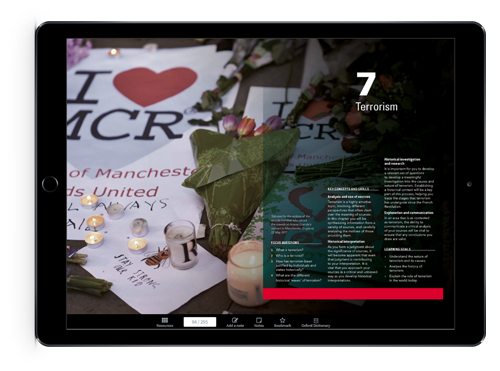
With obook assess, students can:
- access their student book
- access rich, interactive content
- access work assigned by their teacher: reading, homework, tests and assignments
- use their cloud-based obook anywhere, any time, on any device.
Resources for teachers:
- course planners and teacher notes
- answers to every question in the Student book
- printable and editable practice exams
- HSC exam guides
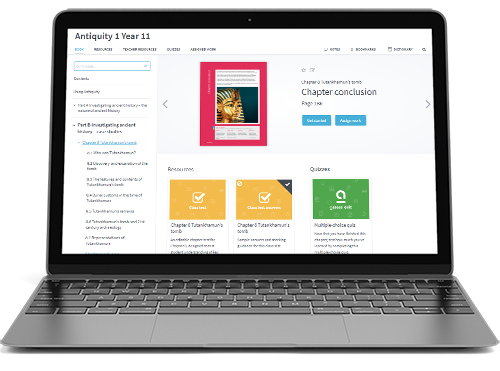
With obook assess, teachers can:
- set up classes
- access editable tests and set assignments
- monitor progress and graph results
- create groups within classes and assign work or tailor instruction to meet the different needs and abilies of students
- view all available content and resources in one place.
Meet Oxford's expert author teams
Antiquity
Toni Hurley has 30 years of experience teaching History in NSW secondary schools. She is the current President of the NSW History Teachers Association and provides lectures for HSC students and professional learning for teachers as part of HTA’s Professional Development program. Toni teaches at Sydney University in the Teacher Education program. She was a member of the ACARA writing team who developed the Ancient History Australian Curriculum.
Christine Murray is a retired secondary school history teacher, with 30 years of experience. She has been teaching at UTS in the Master of Teaching program.
Key Features of Modern History
Bernie Howitt is currently a lecturer in History and Society & Culture Methods in the School of Education at the University of NSW. Bernie has been teaching History since the 1970s and is the winner of two NSW Premier’s History scholarships. He has worked on syllabus development for both the Board of Studies NSW and ACARA and is one of the lead authors of Oxford University Press’ popular junior history series Insight History for New South Wales.
Dr Chris Kenna has a PhD in History and postgraduate qualifications also in Education and Literary Studies. An experienced university tutor and federal public servant, Chris has previously worked for an Indigenous-governed organisation in central Australia and as an aid official posted in Bangladesh. He now teaches History and English at Hawker College in Canberra. Chris is a member of the ACT and NSW History Teachers’ Associations and was recognised as the ACT Secondary Teacher of the Year in 2015.
Stephen Dixon has had a long career teaching all aspects of history across Years 7−12 in New South Wales. He has co-authored several textbooks for both the junior and senior History curriculum. He has extensive experience in the teaching and marking of HSC Modern History and was a regular lecturer for the HTANSW for many years. In 2006 he won a NSW Premier’s Teacher Scholarship to study aspects of World War II on the home front in the United Kingdom.
Dr Bruce Dennett has a PhD in History and a Masters Degree in Education. He is currently lecturing at Notre Dame University and contributes on a freelance basis to Macquarie University’s teacher education program. Bruce has more than forty years’ experience teaching Ancient and Modern History in New South Wales secondary schools and at university level. Bruce is an active member of the History Teachers’ Association of NSW (HTANSW) and has been awarded the Premier’s History Teaching Scholarship twice. Bruce has worked on all five editions of Key Features of Modern History.
Hamish Bragg has extensive experience teaching and marking HSC Modern History. He has a Masters of Research in Australian Second World War History and a Masters of International Relations. Hamish has presented professional learning seminars for the History Teachers Association of NSW and the NSW Association of Independent Schools. He was awarded a Gandel Scholarship in holocaust education in 2014. Hamish currently teaches History at St Aloysius College, Sydney.
Angela Wong has been involved in educational publishing for around 20 years, working with teachers in New South Wales, Victoria and Queensland to help produce texts in all the Years 7 to 12 learning areas. Angela has previously co-authored Oxford University Press’ junior history series Insight History for New South Wales.
Book a consultation and recieve a free copy of Antiquity 2 or Key Features of Modern History 2
Contact your local Oxford Education Consultant today to learn more about the forthcoming editions of Antiquity 2 and Key Features of Modern History 2. All appointments are eligible to receive a free copy of Antiquity 2 or Key Features of Modern History 2.*
Terms and conditions: Book available upon publication. One free book per appointment. Maximum ten free texts per school. For regional customers, appointments can be conducted via Skype.
